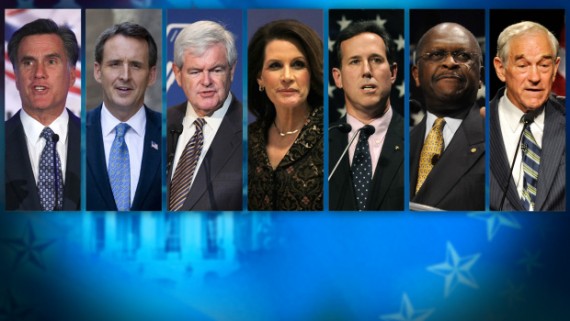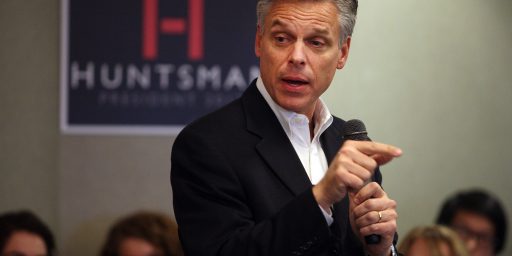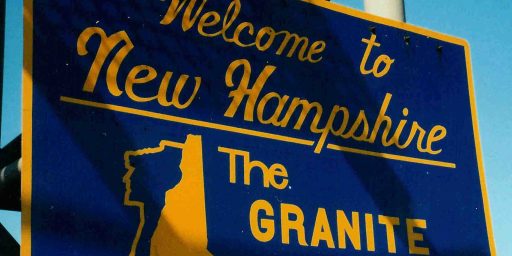Strategic Picking and Choosing on the Route to the Nomination
The GOP contenders are starting the regular ritual of decided how to navigate our rather odd nomination process.
 The LAT has an interesting piece on the current shape of strategic choices by various GOP contenders: Republicans pick their battles in early states.
The LAT has an interesting piece on the current shape of strategic choices by various GOP contenders: Republicans pick their battles in early states.
Specifically, the focus is on the early states of Iowa, New Hampshire, Nevada, and South Carolina.
The main strategic question is about competing in Iowa:
Former Massachusetts Gov. Mitt Romney, the nominal front-runner, is skipping the August Iowa straw poll — an early test of strength in the state that casts the first votes — leading to speculation that he has all but written off the state’s 2012 caucuses. Jon Huntsman, the former Utah governor, announced he would ignore Iowa and its caucuses entirely, focusing instead on New Hampshire, which holds the first primary.
Newt Gingrich, the ex-House speaker, has made only token efforts in the two leadoff states, hopscotching between last week’s New Hampshire debate and appearances around the country on the political lecture circuit.
Of course, one could argue that discussing Gingrich’s plans at this point is a bit of a joke, but I digress.
Speaking of Iowa, Michelle Bachmann is starting her official announcement tour in her birthplace of Waterloo, Iowa next week.
What I find interesting is that candidate continue to ignore the Nevada primary, which is supposed to add some regional diversity to a process that is heavily focused on one midwest (Iowa) and three eastern (NH, SC and FL) states:
None of the major candidates, save Romney, has paid much attention to Nevada, which with South Carolina rounds out the opening quartet of contests.
By picking and choosing, the candidates are trying to control two things — money and expectations…
Indeed, Romney is the one candidate who can probably afford paying attention to an eastern and a western state at the same time. Huntsman may be counting on a regional “favorite son” advantage in Nevada, for that matter.
But, of course, this is one of those cases where if enough people say something is Really Important (like IA and NH) then it becomes Really Important even if, perhaps, it ought not be.
This is not to say that Nevada is an especially good case for regionalization of the process (it’s not), but every cycle I find the over emphasis on two low-population, non-representative states in particular (i.e., IA and NH) to be a really peculiar way to launch the process by which we will choose a potential POTUS. Iowa in particular, with its arcane process that produces a really low turnout is an especially strange choice (and in that regard, the idea that some of the candidates choose to eschew it is probably a good thing).
And yet, this entire process is one that has become so engrained in our national politics that it is unlikely to change (even though it gets talked about every four years). Indeed, if one is looking for examples of American exceptionalism (i.e., a an example where the US is truly different than the rest of the world without argument) the way we nominate (and, heck, elect*) our chief executive would be it.
Not only are primaries unusual in such situations (there have been limited usages of the mechanism in Argentina, Chile, Colombia, and Mexico), no country uses primary elections consistently as a method of choosing presidential candidates for all major party candidates.** No one, however, follows a regional process like ours, let alone one where relatively minor (with apologies to IA and NH) regions of a country have so much sway.
—–
*We are solitary in our use of an indirect method of selecting our president. Argentina and Finland used electoral colleges in the past.
**Colombia came close in 2010, nominating four candidates via nationwide primaries, although the eventual winner, Juan Manuel Santos of La U, was not nominated in that fashion.





